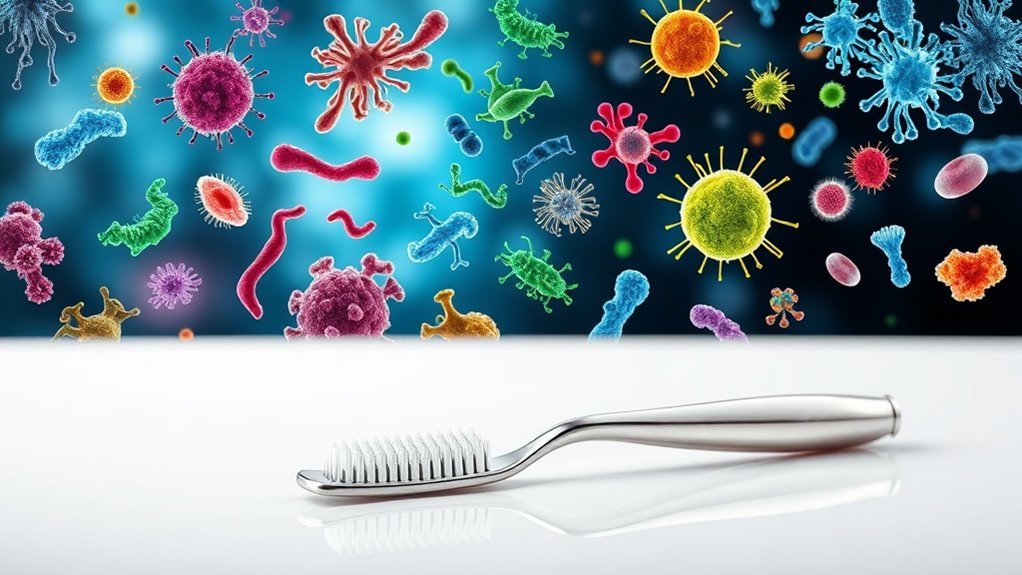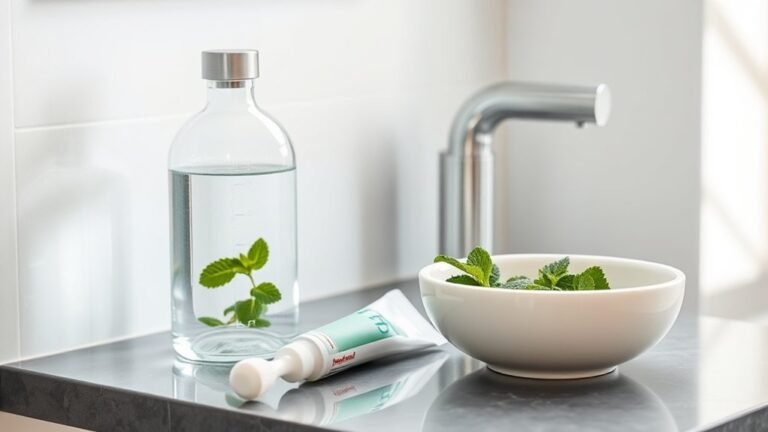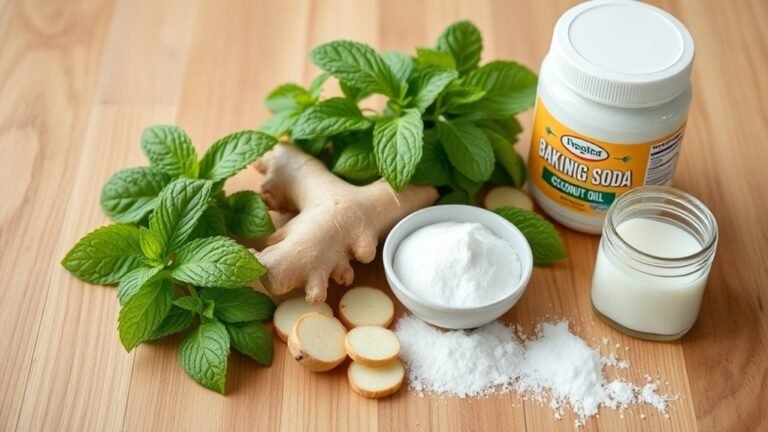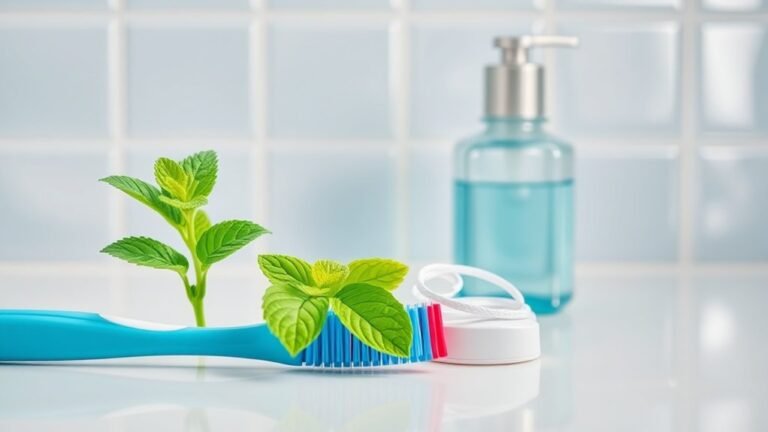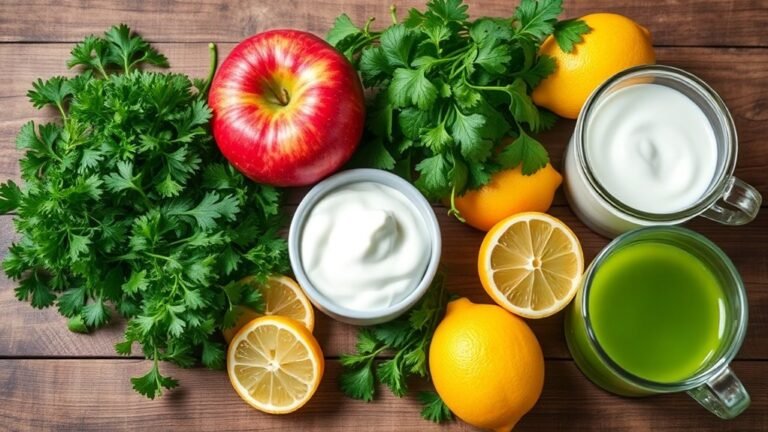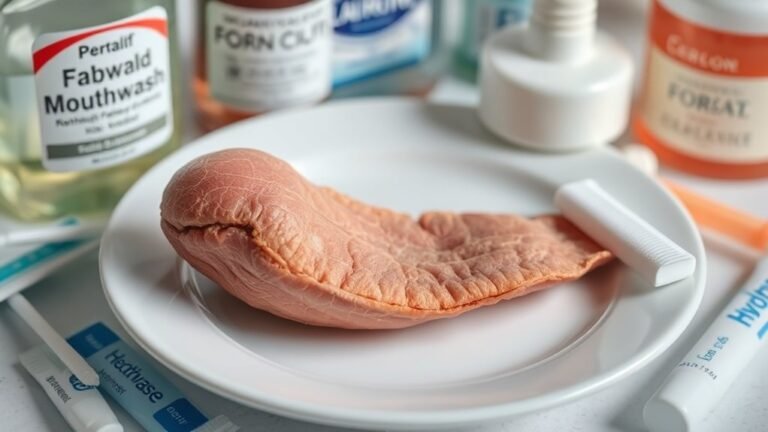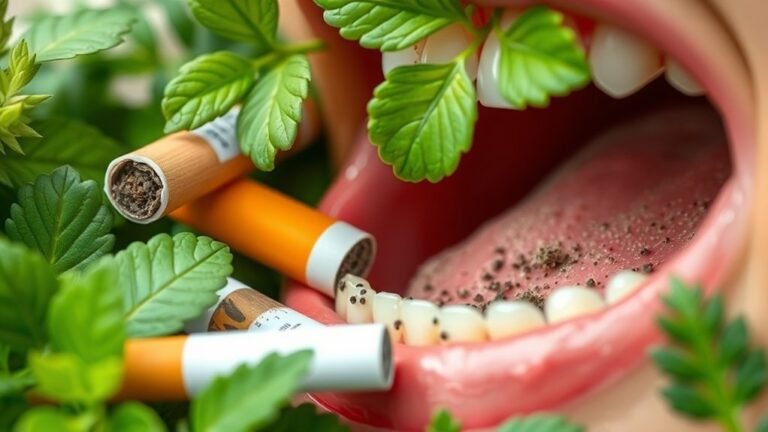Tongue Scraping Removes Sulfur Bacteria That Cause Strong Odor
Tongue scraping effectively removes sulfur bacteria that cause strong odors in your mouth. By physically cleaning the surface of your tongue daily, you eliminate harmful bacteria that produce unpleasant breath. This practice not only freshens your breath but also enhances your overall oral health and taste sensation. Using the right scraper and technique is essential for ideal results. Discover more about the benefits and best practices of tongue scraping to further improve your oral hygiene routine.
Key Takeaways
- Tongue scraping eliminates debris, bacteria, and dead cells, reducing sulfur compounds that contribute to bad breath.
- Regular scraping minimizes the growth of odor-causing bacteria on the tongue’s surface.
- Enhanced oral hygiene from tongue scraping leads to fresher breath and improved overall mouth health.
- Consistent practice, ideally each morning before brushing, is essential for effective odor reduction.
- Choosing the right scraper material and design can improve comfort and efficiency during tongue scraping.
What Is Tongue Scraping?
Tongue scraping is a simple yet effective oral hygiene practice that involves using a tool to remove debris, bacteria, and dead cells from the surface of your tongue. This process, known as tongue cleaning, helps enhance your overall oral health by reducing harmful bacteria that can contribute to bad breath and other dental issues. You can perform tongue scraping daily, preferably in the morning before brushing your teeth. Using a dedicated scraper or a spoon, gently glide the tool from the back of your tongue to the front, rinsing it off as needed. This ritual not only freshens your breath but also promotes a cleaner mouth, making it an essential addition to your oral hygiene routine.
The Science Behind Bad Breath
Bad breath often stems from bacteria in your mouth that produce sulfur compounds, leading to unpleasant odors. Understanding the role of these bacteria highlights the importance of maintaining good oral hygiene to combat bad breath effectively. By addressing these factors, you can markedly improve your breath and overall oral health.
Bacteria and Bad Breath
Oral bacteria play an essential role in the development of bad breath, scientifically known as halitosis. These bacteria thrive in your mouth, particularly on the tongue, where they form a layer of tongue bacteria. When food particles break down, these bacteria produce volatile compounds that can lead to unpleasant breath odor. It’s not just about poor oral hygiene; certain foods and medical conditions can also contribute to bacterial growth. If you don’t regularly clean your tongue, the buildup of bacteria can intensify breath issues. By incorporating tongue scraping into your daily routine, you can effectively reduce these bacteria, improving your breath and overall oral health. So, take a few moments each day to keep your tongue bacteria in check!
Sulfur Compounds Explained
Sulfur compounds are significant contributors to the unpleasant odor often associated with bad breath. These compounds result from the activity of sulfur bacteria in your mouth, which break down food particles and dead cells. Understanding these compounds can help you tackle bad breath effectively. Here are three key sulfur compounds to know:
- Hydrogen Sulfide: This gas has a rotten egg smell and is a primary culprit behind bad breath.
- Methyl Mercaptan: It can produce an odor similar to rotten cabbage and is often present in decaying matter.
- Dimethyl Sulfide: Though less common, it can also contribute to foul breath.
Being aware of sulfur bacteria and their byproducts can empower you to take action against bad breath.
Oral Hygiene Importance
Maintaining proper hygiene in your mouth is essential for preventing bad breath and promoting overall health. A consistent oral care routine, which includes brushing, flossing, and tongue scraping, is crucial for effective breath odor control. Bacteria thrive in your mouth, particularly on your tongue, where they produce sulfur compounds that lead to unpleasant odors. By incorporating tongue scraping into your daily routine, you can greatly reduce these bacteria and enhance your breath freshness. Additionally, regular dental check-ups and proper hydration further support your oral hygiene efforts. Remember, good oral health not only boosts your confidence but also contributes to your overall well-being. Prioritize your mouth’s hygiene to enjoy fresher breath and a healthier life.
How Tongue Scraping Works
Tongue scraping works by physically removing bacteria and debris from your tongue’s surface. This process not only helps eliminate bad breath but also promotes better oral health. Understanding the mechanism of action and the benefits of scraping can enhance your daily oral hygiene routine.
Mechanism of Action
While you may not realize it, your tongue harbors a considerable amount of bacteria, food particles, and dead cells that contribute to bad breath. Tongue scraping is an effective way to combat this issue. Here’s how it works:
- Physical Removal: The scraping action helps lift and remove breath odor bacteria and debris from the surface of your tongue.
- Surface Cleaning: By clearing away this buildup, you reduce the potential for bacteria to produce volatile sulfur compounds, which are responsible for unpleasant odors.
- Enhanced Oral Hygiene: Regular tongue scraping can improve your overall oral health, promoting fresher breath and a cleaner mouth.
Incorporating tongue scraping into your daily routine can considerably reduce breath odor and enhance your confidence.
Bacterial Removal Process
A thorough understanding of the bacterial removal process involved in tongue scraping can considerably enhance your oral hygiene routine. When you scrape your tongue, you’re effectively removing debris, food particles, and sulfur-producing bacteria that accumulate on the surface. This action promotes bacterial control, preventing the overgrowth of harmful microorganisms that can disrupt your oral microbiome. By eliminating these bacteria, you not only reduce bad breath but also support a balanced ecosystem in your mouth. The scraping motion dislodges bacteria and biofilm, making it easier for your saliva to neutralize acids and support healthy oral flora. Regular tongue scraping is a simple yet powerful practice that can lead to improved overall oral health.
Benefits of Scraping
Scraping your tongue offers a range of benefits that go beyond just freshening your breath. By incorporating tongue scraping into your daily routine, you can experience the following advantages:
- Enhanced Oral Hygiene: Removing bacteria and debris helps maintain a healthier mouth.
- Improved Taste Sensation: Clearing your tongue can heighten your sense of taste, making food more enjoyable.
- Reduced Bad Breath: Regular tongue scraping effectively eliminates the sulfur bacteria responsible for unpleasant odors.
With consistent practice, tongue scraping not only promotes breath freshening but also contributes to overall oral health. It’s a simple yet effective step you can take to enhance your daily hygiene routine, ensuring your mouth feels clean and refreshed.
Benefits of Tongue Scraping
Tongue scraping offers several benefits that can greatly enhance your oral hygiene routine. By regularly practicing tongue scraping, you can effectively remove sulfur bacteria that contribute to bad breath. This simple technique not only freshens your breath but also helps reduce the risk of oral infections. When you eliminate excess bacteria from your tongue, you create a healthier environment in your mouth, promoting overall oral health. Additionally, tongue scraping can improve your sense of taste by removing debris that may dull your taste buds. Incorporating this practice into your daily routine can lead to a cleaner mouth and a more confident smile. Overall, tongue scraping is an easy yet impactful step toward better oral hygiene and well-being.
How to Properly Scrape Your Tongue
To properly scrape your tongue, start by choosing a suitable tongue scraper made of plastic or stainless steel. This simple step is essential for maintaining effective dental hygiene and enhancing your breath odor treatment.
- Position the scraper: Place it at the back of your tongue, ensuring it’s comfortable and not too forceful.
- Apply gentle pressure: Pull the scraper forward along your tongue, removing debris and bacteria without causing discomfort.
- Rinse and repeat: Rinse the scraper after each pass and continue until you’ve covered the entire surface of your tongue.
Incorporating tongue scraping into your daily routine can substantially improve your oral health and help combat bad breath, making it a worthwhile addition to your dental hygiene practices.
Choosing the Right Tongue Scraper
Choosing the right tongue scraper can greatly impact your oral hygiene routine. When selecting a scraper, consider the material: stainless steel, plastic, and silicone are popular choices. Stainless steel is durable and easy to clean, while plastic is lightweight and often more affordable. Silicone scrapers offer flexibility and comfort.
Look for a design that fits your mouth comfortably, as ease of use encourages regular tongue scraping. Some scrapers have a wider surface area to cover more of your tongue, effectively removing mouth bacteria that cause bad odors. Additionally, choose a scraper with a comfortable grip to guarantee you can maintain control while scraping. Investing in a quality tongue scraper can markedly enhance your daily oral care and help combat unpleasant breath.
Incorporating Tongue Scraping Into Your Routine
When you incorporate tongue scraping into your daily routine, you’ll enhance your overall oral hygiene and combat bad breath effectively. This simple practice can help reduce halitosis by removing sulfur bacteria from your tongue’s surface. To get started, consider these steps:
Enhance your oral hygiene and reduce halitosis by incorporating daily tongue scraping into your routine.
- Choose the Right Time: Scrape your tongue every morning before brushing your teeth for best results.
- Use Proper Technique: Gently scrape from the back of your tongue to the front, rinsing the scraper after each pass.
- Stay Consistent: Make tongue scraping a non-negotiable part of your hygiene routine for lasting benefits.
Frequently Asked Questions
Can Tongue Scraping Replace Regular Brushing and Flossing?
No, tongue scraping can’t replace regular brushing and flossing. You need to maintain a thorough oral hygiene routine, as brushing and flossing effectively clean teeth and gums, preventing cavities and gum disease.
How Often Should I Scrape My Tongue?
Think of your tongue as a garden; you wouldn’t let weeds grow unchecked. Scrape your tongue daily, ideally each morning, to maintain a clean slate and promote overall oral health alongside regular brushing and flossing.
Is Tongue Scraping Safe for Children?
Yes, tongue scraping is generally safe for children. Just guarantee you use a gentle technique and choose an age-appropriate scraper. It’s a good habit to promote oral hygiene, but always supervise younger kids during the process.
What Materials Are Tongue Scrapers Made From?
Tongue scrapers typically come crafted from stainless steel, plastic, or silicone. Each material offers unique benefits, like durability or flexibility, ensuring you find a scraper that suits your specific needs and preferences for effective oral hygiene.
Can Tongue Scraping Help With Other Oral Health Issues?
Yes, tongue scraping can improve your oral health by reducing bacteria, enhancing taste sensation, and promoting fresher breath. It complements regular brushing and flossing, helping you maintain a cleaner mouth and overall better oral hygiene.
Conclusion
Incorporating tongue scraping into your daily routine can revolutionize your oral hygiene like nothing else! Imagine banishing the sulfur bacteria that wreak havoc on your breath, leaving you with a fresh, minty mouth that could make even the most expensive mouthwash jealous. With just a few simple strokes each day, you can elevate your confidence and transform your interactions. Don’t let bad breath hold you back—embrace tongue scraping and reveal a new level of freshness that’s simply unstoppable!
